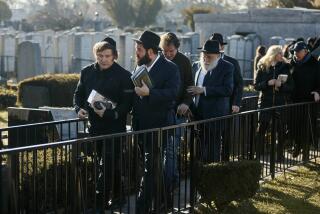Iraqis say civilians killed in U.S. raid
U.S. forces engaged in an hours-long gun battle with militants during an early-morning raid in the Iraqi capital’s Shiite Muslim district of Sadr City on Sunday. American officials said as many as 49 people were killed in the fighting.
The Iraqi government said many of the victims were civilians and protested the action. The American military said that all of those killed were “criminals.”
A freelance correspondent for The Times said he saw the corpses of a woman and two small children. The wounded included two boys, 8 and 11, who were interviewed in their beds at Imam Ali Hospital by The Times. Another man said his 18-month-old son was killed, as well as a neighbor’s son who was the same age.
U.S. officials said the forces did not capture or kill the raid’s target, identified as the leader of a kidnapping cell that is part of a Shiite militant movement called the Special Groups -- a splinter group of the Mahdi Army militia no longer following orders from radical cleric Muqtada Sadr. American officials believe the splinter group is trained, funded and supplied by Iran through its Revolutionary Guard forces.
The White House declined to comment on the clash in Sadr City.
The fighting followed recent incidents in which U.S. forces killed 15 civilians in an attack on alleged leaders of the insurgent group Al Qaeda in Iraq, and Western private security contractors shot and killed 17 Iraqi civilians, inflaming anti-U.S. sentiment.
In two raids this summer on Sadr City, American soldiers killed more than 50 people.
In parliament Sunday, Iraqi officials discussed the possibility of placing restrictions on U.S. military operations in Iraq when they negotiate the terms of the United Nations resolution that authorizes the U.S. presence here. The resolution comes up for its annual reauthorization before year’s end.
Iraqi Prime Minister Nouri Maliki issued a statement demanding that the U.S. not use such overwhelming force in pursuing targets, and that it further coordinate its efforts with Iraqi forces. He said the government would conduct an investigation of the Sadr City incident.
Iraqi government spokesman Ali Dabbagh, speaking on CNN’s “Late Edition with Wolf Blitzer,” said that such attacks were “not creating a good atmosphere.”
“We have today, again, one more problem created.”
In Najaf, Sheik Salah Ubaidi, a spokesman for Sadr, who has called for near-term rapprochement with the U.S., said: “We denounce these acts. We have no option but to denounce. We have grown tired from the many denouncements we have made.”
The Iraqi Interior Ministry, which oversees the Iraqi police force, said 13 civilians were killed and 69 wounded. The U.S. military issued two statements in which the total number of dead grew to 49 from six. Officials did not explain how they arrived at the casualty figures or explain the discrepancy between their total and that of the Iraqi government. A military spokesman said there were no U.S. casualties in the incident.
According to the initial U.S. account, ground forces arrived in Sadr City, a Mahdi Army stronghold, and began clearing buildings where their target was believed to be when they came under fire from machine guns and grenade launchers.
The soldiers called in airstrikes that killed six assailants, American authorities said. While leaving the area, they said, the forces were targeted by a roadside bomb.
In a subsequent account, the U.S. said the ground forces had returned fire in the initial attack, killing an additional 33 people. American officials said ground forces had continued to come under fire as they left the area, and that 10 more combatants were killed in that fighting.
In both accounts, the military said it was “unaware of any innocent civilians being killed as a result of this operation.”
Iraqi witnesses gave a mostly similar account: Combatants in the neighborhood began firing on the U.S. troops, and a battle raged for more than two hours across several blocks in the neighborhood, damaging apartment buildings, a bakery, a power generator and several cars. Columns of black smoke rose into the sky.
But the Iraqi witnesses’ details about casualties differed widely from those provided by the Americans. “The pilot shot me when I crossed the street to buy bread,” 11-year-old Ali Ahmad said from his hospital bed. “I have been hit by shrapnel in my chest.”
“I was going to buy eggs for breakfast, then I was hit by a helicopter,” said Murtada Naim, an 8-year-old who was also interviewed in his hospital bed. He appeared to have suffered wounds to his chest and hand.
Ismail Mikilf Hassan, 47, said his toddler was killed when a missile hit his house, and that his 19-year-old son, who was in the hospital, had been wounded by shrapnel.
“The missile penetrated the ceiling and hit inside the room,” he said. “I have a 1 1/2-year-old baby -- he was killed when his belly was opened. My second son is lying there on the bed and his belly is filled with shrapnel. I do not know if he is going to live or die.”
Abu Qassim said his young son also was killed. “This should not happen!” he said. “Are these children from the Mahdi Army?”
Meanwhile, Iraqi police said three people were killed and three injured when a mortar round hit their car as they traveled through east Baghdad on Sunday evening. Police also said they found the bodies of six men, who had been shot to death, in the capital.
christian.berthelsen@latimes.com
Times staff writers Usama Redha, Raheem Salman, Saif Hameed and Wail Alhafith in Baghdad and Alan C. Miller in Washington, and a special correspondent in Sadr City contributed to this report.
More to Read
Start your day right
Sign up for Essential California for news, features and recommendations from the L.A. Times and beyond in your inbox six days a week.
You may occasionally receive promotional content from the Los Angeles Times.






